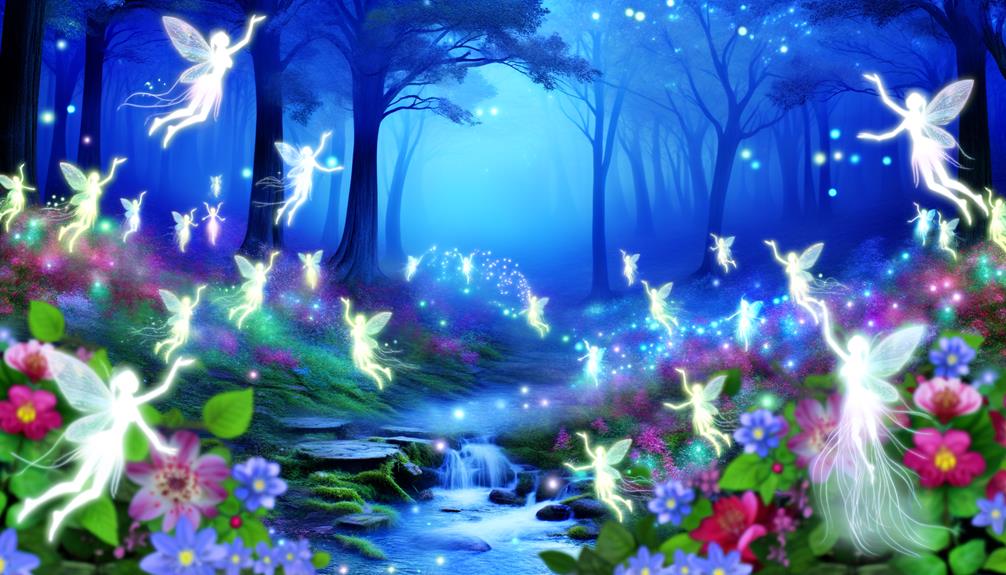Meaning of the Name Fae
The name 'Fae' originates from the Old French 'fae' or 'fé,' denoting 'fairy.' Its linguistic roots trace back to Latin 'fata,' meaning 'fate.' Throughout history, 'Fae' has been imbued with a mystical allure, deeply woven into European folklore and literary masterpieces. In Celtic and Norse traditions, fae are often depicted as enchanting beings with magical powers.
The name encapsulates a rich tapestry of cultural significance, from medieval legends to Victorian revival. In contemporary times, 'Fae' is cherished for its ethereal beauty and timeless charm.
To explore its deeper connections and enduring appeal, consider the multifaceted dimensions of this enchanting name.

Key Takeaways
- The name 'Fae' means 'fairy' and has roots in Old French and Latin.
- Fae symbolizes mystical and enchanting elements in folklore and literature.
- The name reflects humanity's fascination with mystical and hidden aspects of life.
- Fae is associated with magical abilities and nature in Celtic mythology.
- Modern usage of 'Fae' combines historical reverence with a contemporary aesthetic allure.
Origins of Fae
The name 'Fae' traces its origins back to Old French, derived from the term 'fae' or 'fée,' which means 'fairy' and is imbued with significant historical and cultural implications of enchantment and otherworldliness.
Etymologically, the word is grounded in the Latin 'fata,' signifying 'fate,' highlighting the mystical and predetermined characteristics often associated with fairies.
Over time, 'fae' has developed across diverse European customs, sparking imaginations with its link to supernatural beings possessing magical abilities.
The cultural importance of 'fae' goes beyond just naming; it mirrors humanity's profound interest in the hidden and the mystical. This intricate etymological and cultural fabric has guaranteed that 'Fae' continues to be a name that inspires a feeling of magic and awe.
Fae in Folklore
In folklore, the name Fae is intrinsically linked to mythical creatures such as fairies, elves, and other ethereal beings. Historically, these entities have been endowed with magical abilities and traits that transcend human capabilities, often playing significant roles in cultural narratives and legends.
The linguistic roots of Fae trace back to Old French and Latin, underscoring its longstanding cultural significance across various European traditions.
Mythical Creatures Association
Rooted deeply in various cultural mythologies, fae often represent mystical beings with origins in ancient folklore, embodying enchantment and otherworldly traits.
The term 'fae' derives from the Old French 'fae,' itself from Latin 'fata,' meaning fate or destiny.
Historically, fae are associated with European legends, particularly in Celtic and Norse traditions, where they are depicted as ethereal entities inhabiting natural landscapes.
These beings are not only central to mythological narratives but also hold cultural significance, often symbolizing the mysterious forces of nature and the unseen world.
In literary contexts, fae appear in medieval tales and romantic poetry, reinforcing their role as timeless icons of beauty, magic, and the supernatural.
Magical Abilities and Traits
Fae, often depicted with an array of supernatural abilities, are central figures in folklore, known for their capacity to manipulate nature and wield enchantment. Historically, these beings, also referred to as fairies, derive their name from the Old French "fae," linked to the Latin "fata," meaning fate. Their cultural significance spans across various traditions, embodying elements of mystery and magic. The following table highlights some common traits and abilities attributed to Fae in different cultures:
| Trait/Ability | Cultural Association |
|---|---|
| Shape-shifting | Celtic folklore |
| Control over nature | European fairy tales |
| Granting wishes | Arabian Nights (Jinn) |
| Immortality | Greek mythology (Nymphs) |
Understanding these traits enriches our appreciation of the breadth and depth of Fae mythology.
Literary References
Throughout literary history, the name 'Fae' has frequently appeared in various works, often symbolizing mystical and enchanting elements. Originating from the Old French word 'fae' and Latin 'fata,' meaning fate, it denotes beings associated with magic and destiny.
In medieval literature, 'Fae' characters often embody ethereal qualities, appearing in texts such as Edmund Spenser's 'The Faerie Queene,' where they represent purity and otherworldliness. Shakespeare's 'A Midsummer Night's Dream' also highlights the Fae, portraying them as powerful, whimsical entities.
These literary references underscore the name's deep-rooted association with the supernatural. The recurrence of 'Fae' in literature not only reflects its historical and linguistic origins but also enriches its portrayal as a symbol of enchantment and mystery.
Cultural Significance
The name 'Fae' holds a profound cultural significance, often evoking images of mystical beings and enchanting worlds across various societies.
Historically, the term 'Fae' is derived from the Old French 'fae', which means fairy or enchantress, tracing further back to the Latin 'fata', meaning fate.
Within Celtic mythology, fae are entities associated with nature, possessing magical abilities and often acting as guardians of natural domains.
In medieval European folklore, the fae were seen as otherworldly beings, embodying the mysteries of the natural world.
Across cultures, the name 'Fae' encapsulates a connection to the ethereal and the supernatural, symbolizing a bridge between the human and the mystical, deeply embedded in the collective imagination of many traditions.
Modern Usage
In contemporary contexts, the name 'Fae' has transcended its folkloric origins to become a popular choice for individuals seeking a name that conveys mystical charm and ethereal beauty. Rooted in Old French and Middle English, where it signified fairy-like beings, 'Fae' now enjoys a revival in modern naming conventions.
This resurgence reflects society's renewed interest in fantasy literature and media, where names evoking magic and enchantment are particularly appealing. Moreover, 'Fae' is often selected for its brevity and phonetic simplicity, making it accessible across various cultures. Its adoption signifies a blend of historical reverence and modern aesthetic sensibilities, embodying both tradition and contemporary allure.
Therefore, 'Fae' continues to enchant the modern imagination with its timeless mystique.
Variations of Fae
The name Fae exhibits a fascinating array of common spellings and forms, including Fay, Faye, and Fey, each with its own historical resonance and cultural implications.
Rooted in Old French and Middle English, these variations often connect to folklore and mythological traditions, particularly those involving fairies and enchantment.
Moreover, historical and cultural variants span across different eras and regions, enriching the name with a diverse and storied heritage.
Common Spellings and Forms
Numerous variations of the name Fae have emerged over centuries, reflecting its rich historical context, diverse linguistic roots, and significant cultural resonance. These variations often adapt the phonetic elements and stylistic nuances of different languages and cultures. The name Fae, meaning "fairy" or "fate," has retained its ethereal connotations across these forms.
| Variation | Linguistic Root |
|---|---|
| Fay | English |
| Fée | French |
| Feya | Slavic Languages |
Each variant not only highlights the name's linguistic adaptability but also underscores its cultural significance, from English folklore to French mythology and Slavic traditions. These spellings and forms demonstrate the name's enduring appeal and its ability to cross cultural boundaries while maintaining its mystical essence.
Historical and Cultural Variants
Exploring the historical and cultural variants of the name Fae reveals a tapestry of mythological and linguistic evolution, reflecting its journey through various societies and eras.
Originating from the Old French word 'fae,' meaning fairy, the name has roots in Latin 'fata,' denoting fate or destiny.
In Celtic traditions, Fae is associated with mystical beings and enchantments. Scandinavian folklore also embraces similar entities, known as 'vættir.'
In Middle Eastern cultures, the name resonates with 'Peri,' celestial beings of Persian mythology.
Throughout history, Fae has been adapted linguistically and culturally, encapsulating the essence of otherworldly charm and mystery.
Its enduring presence across different civilizations underscores a shared human fascination with the supernatural and the ethereal.
Popularity Trends
Popularity trends for the name Fae reveal a fascinating journey through various historical periods and cultural landscapes. In medieval Europe, the name Fae, derived from the Old French 'faie' meaning fairy, held a mystical allure.
During the Victorian era, an era known for its fascination with folklore and the supernatural, the name experienced a resurgence.
In modern times, the name Fae has seen fluctuating popularity, often perceived as whimsical and enchanting. Its resurgence in contemporary usage can be attributed to a renewed interest in vintage and nature-inspired names.
The name's ethereal quality continues to captivate, reflecting a blend of cultural heritage and linguistic beauty that transcends generations.
Conclusion
The name 'Fae' can be likened to a shimmering tapestry woven with threads of linguistic roots, historical context, and cultural significance. From its ancient origins to its presence in folklore and literature, 'Fae' represents more than a mere designation; it embodies a legacy of myth and wonder.
As modern usage continues to evolve, variations of 'Fae' reflect the enduring allure of the mystical and the ethereal, echoing through time like an everlasting enchantment.






